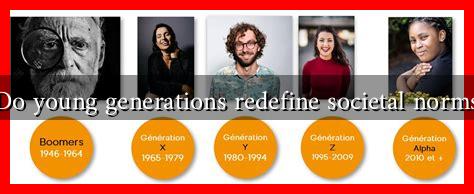-
Table of Contents
Do Young Generations Redefine Societal Norms?
In recent years, the influence of younger generations on societal norms has become increasingly evident. From social justice movements to shifts in workplace culture, millennials and Generation Z are challenging traditional values and redefining what is considered acceptable. This article explores how these young generations are reshaping societal norms, the factors driving these changes, and the implications for the future.
The Power of Social Media
One of the most significant tools at the disposal of younger generations is social media. Platforms like Instagram, Twitter, and TikTok have become powerful channels for activism and self-expression. They allow young people to share their views, mobilize support, and challenge the status quo.
- Amplifying Voices: Social media has democratized the way information is shared, enabling marginalized voices to be heard. Movements like #BlackLivesMatter and #MeToo gained momentum through online platforms, highlighting issues of racial injustice and sexual harassment.
- Creating Communities: Young people use social media to form communities around shared interests and values, fostering a sense of belonging and collective action.
- Influencing Trends: Social media trends often reflect changing societal values, from body positivity to mental health awareness, showcasing a shift towards inclusivity and acceptance.
Shifts in Work Culture
The workplace is another area where young generations are making their mark. As millennials and Gen Z enter the workforce, they bring with them different expectations and values regarding work-life balance, job satisfaction, and corporate responsibility.
- Work-Life Balance: Younger workers prioritize flexibility and mental health, often seeking remote work options and flexible hours. According to a survey by FlexJobs, 73% of millennials consider work-life balance a top priority when choosing a job.
- Corporate Responsibility: Young employees are more likely to support companies that align with their values. A study by Cone Communications found that 64% of millennials would not take a job if they believed the company’s corporate social responsibility was not up to par.
- Emphasis on Diversity: Younger generations advocate for diverse and inclusive workplaces, pushing companies to implement policies that promote equality and representation.
Redefining Relationships and Family Structures
Young generations are also redefining personal relationships and family structures. Traditional notions of marriage, parenting, and gender roles are being challenged as societal expectations evolve.
- Delaying Marriage: Many young people are choosing to delay marriage and prioritize personal development, education, and career advancement. According to the Pew Research Center, the median age for first marriages has increased significantly over the past few decades.
- Alternative Family Structures: The rise of single-parent households, cohabitation without marriage, and LGBTQ+ families reflects a broader acceptance of diverse family structures.
- Gender Roles: Younger generations are increasingly rejecting traditional gender roles, advocating for equality in domestic responsibilities and career opportunities.
Case Studies: The Impact of Youth Movements
Several case studies illustrate the profound impact of young generations on societal norms:
- Climate Activism: The global climate movement, spearheaded by young activists like Greta Thunberg, has brought environmental issues to the forefront of public discourse, urging governments and corporations to take action.
- Gun Control Advocacy: Following tragic school shootings, young activists from movements like March for Our Lives have mobilized to advocate for stricter gun control laws, reshaping the conversation around gun violence in America.
Conclusion: The Future of Societal Norms
As younger generations continue to challenge and redefine societal norms, the implications for the future are profound. Their emphasis on inclusivity, sustainability, and social justice is reshaping not only individual lives but also the fabric of society as a whole. The power of social media, changing workplace dynamics, and evolving personal relationships are just a few examples of how these young voices are making a lasting impact.
In summary, young generations are not merely passive observers of societal change; they are active participants and leaders in redefining what is considered normal. As we move forward, it will be essential to listen to and support these voices, as they hold the key to a more equitable and progressive future.
For further reading on the impact of youth movements, visit Pew Research Center.

